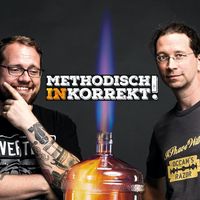Very Bad Wizards is a podcast featuring a philosopher (Tamler Sommers) and a psychologist (David Pizarro), who share a love for ethics, pop culture, and cognitive science, and who have a marked inability to distinguish sacred from profane. Each podcast includes discussions of moral philosophy, recent work on moral psychology and neuroscience, and the overlap between the two.
http://sites.libsyn.com/474285/site
Gesamtlänge aller Episoden: 17 days 21 hours 41 minutes
recommended podcasts
episode 167: The Big Lebowski vs Pulp Fiction (Pt. 1)
There are only two kinds of people in the world, Pulp Fiction people and Big Lebowski people. Now Pulp Fiction people can like Big Lebowski and vice versa, but nobody likes them both equally. Somewhere you have to make a choice. And that choice tells you
episode 166: Total Recall (Ted Chiang's "The Truth of Fact, the Truth of Feeling")
Memory is highly selective and often inaccurate. But what if we had an easily searchable video record of all our experiences and interactions? How would that affect our relationships? What would it reveal about our characters and our sense of who we ar
episode 165: Life With No Head (With Sam Harris)
Sam Harris returns to the podcast to talk about meditation and his new _Waking Up_ meditation app. What are the goals of mindfulness practice - stress reduction and greater focus, or something much deeper? Can it cure David's existential dread? Tamler's f
episode 164: Choosing to Believe
David and Tamler argue about William James' classic essay "The Will to Believe." What's more important - avoiding falsehood or discovering truth? When (if ever) is it rational to believe anything without enough evidence? What about beliefs that we can't b
episode 163: Should I Stay or Should I Go? (Ursula K. Le Guin's "The Ones Who Walk Away from Omelas")
David and Tamler are pulled into Ursula K. Le Guin's "The Ones Who Walk Away from Omelas." Omelas is a truly happy city, except for one child who lives in abominable misery. Is that too high a moral cost? Why do some people walk away from the city? Why do
episode 162: Parents Just Don't Understand (with Paul Bloom)
As parents we like to think we have an impact on our children - their future, their happiness, the kinds of people they turn out to be. But are we deluded? Dave and Tamler are joined by empathy's kryponite, the great Paul Bloom, to talk about Judith Rich
episode 161: Reach-Around Knowledge and Bottom Performers (The Dunning-Kruger Effect)
The less we know, the more we know it. David and Tamler talk about the notorious Dunning-Kruger effect, which makes us overconfident in beliefs on topics we're ignorant about and under-confident when we're experts. Plus, we break down an evolutionary psyc
episode 160: Everything is Meaningless: The Book of Ecclesiastes
David and Tamler dive into the book of Ecclesiastes, an absurdist classic that is somehow also a book of the Bible. Is everything meaningless, vain, and a chasing after the wind? Are humans just the same as animals? Are wise people no better off than fool
episode 159: You Have the Right to Go to Prison
Poor and black defendants have more legal rights than ever, but that didn't stop mass incarceration. Why is that? We talk about a paper by Paul Butler called "Poor People Lose: Gideon and the Critique of Rights." Plus, we answer the question that’s on
episode 158: False Dichotomies and Oral Reciprocity
David and Tamler talk about the invasion of dual process theories in psychology. Why do we love theories that divide complex phenomena into just two categories? Is there any evidence to back up these theories? Are we distorting our understanding of the mi








































